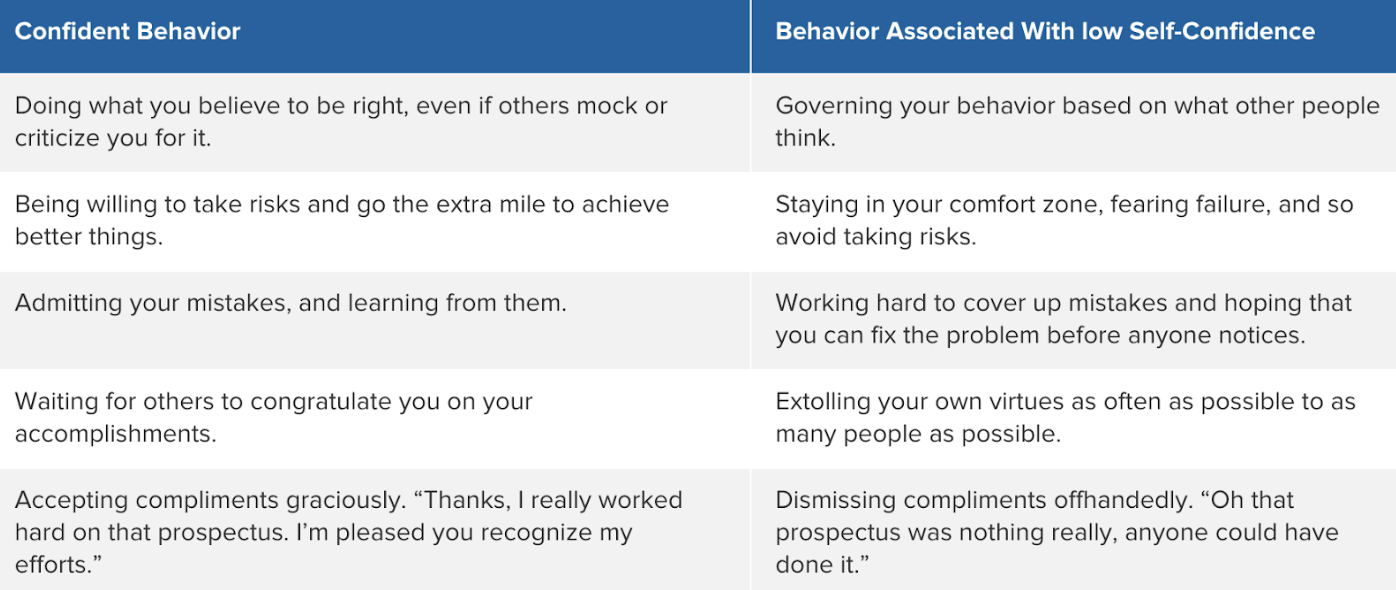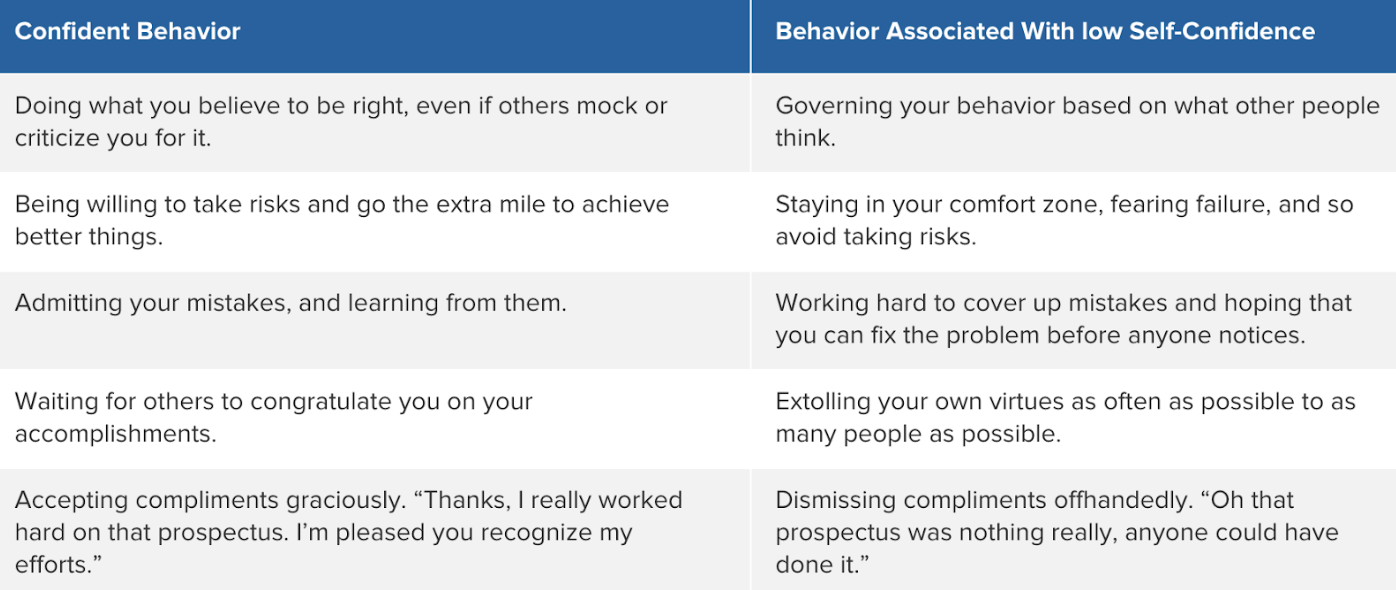Confidence is a feeling that people develop and work on over time. Think about it in terms of a cycle: When someone is at the top of the cycle, they are focused on their successes and accomplishments, meaning they might feel confident and strong. The feeling of low confidence and not being good or smart enough often manifests as stress or anxiety. Unless you are actually trying to avoid becoming the lion’s lunch, there’s no reason to feel these feelings. You’ll feel more motivated to act If someone is confident in their ability to successfully do something, they’re more likely to volunteer to complete a task than someone who is less confident. One person in the group says, “I know I can lead us to success, and I already have a few ideas I’d like to share with you on how to accomplish this.” Another person in the group says, “I don’t really like leadership roles, but I guess I could try if you all really want me to.” The first person seems a lot more convincing, right? You have a greater potential for success There are several studies that show a strong positive correlation between high levels of self-confidence and success. This will make you feel good and boost your confidence. Then, work on some of your weaknesses. Here are a few podcasts that will help you build your self-confidence: This podcast gives you insight and advice on ways to work through your fears, boost self-esteem, and build your confidence in both your personal and professional lives.
“To establish true self-confidence, we must concentrate on our successes and forget about the failures and the negatives in our lives.” — Denis Waitley
I know what you’re thinking … easier said than done, right?
Nobody is born with high or low self-confidence. Confidence is a feeling that people develop and work on over time. For most people, confidence is something that comes and goes.
Think about it in terms of a cycle: When someone is at the top of the cycle, they are focused on their successes and accomplishments, meaning they might feel confident and strong. But when they are at the bottom of their cycle, they are focused on their failures and may feel low self-confidence or even defeat.
If you can identify with the feeling I’m referring to at the bottom of the confidence cycle, know you’re not alone. Everyone struggles with self-confidence every now and then. The key is realizing that confidence is like a muscle — the more you work on it, the easier it will become for you to use and maintain.
This article will teach you why everyone should work on their self-confidence, and it’ll provide you with ways to build your self-confidence.
But first — what is self-confidence?
What is Self-Confidence?
Self-confidence is the feeling you have when you strut into a job interview knowing you’re going to impress the hiring manager. A person feels confident when they believe they can successfully do something by applying their judgement, knowledge, and prior experiences.
How Does Self Confidence Impact Your Life?
Think about a time when you felt extremely confident in your ability to do something.
Did you feel an adrenaline rush? Did you feel strong and powerful? Did you feel as though you could conquer the world?
Self-confidence does a lot of things for us. It boosts our self-esteem, diminishes stress, and often pushes us to act. But most importantly, it makes us feel good about ourselves.
Let’s dive into a few more ways self-confidence impacts our lives:
Your happiness and self-esteem will increase
Self-esteem is closely related to confidence but has a slightly different definition — it is a person’s evaluation of their self-worth and value.
There is a direct correlation between confidence and self-esteem. When you believe in yourself — your talents, capabilities, worth, and potential — both your self-esteem and confidence increase.
When your self-esteem increases, you believe you are worthy of the life you dream of and the success you desire. Not only will you become more confident, but you will more easily accept your failures, give yourself the credit you deserve, accept new challenges, and become happier.
In fact, self-esteem always exists with happiness — and there are studies to prove it. In almost every instance, people who feel good about themselves are significantly happier than those who lack self-worth. When self-confidence increases, your self-esteem and happiness do the same.
Think about it in terms of the following chart. Most people would feel high self-esteem, sure about their abilities, and good about standing up for their beliefs when behaving confidently — as listed in the left column. They are doing what makes them happy. The opposite is true about the right column.

Your stress and anxiety will decrease
Did your math teacher ever randomly call on the students who weren’t the strongest mathematicians to complete a problem in front of the entire class? Mine did.
Could you sense the stress and anxiety fuming from those students (yes … I was one of them) as they reluctantly walked to the front of the classroom?
My palms were sweaty and my right hand would shake while writing on the chalkboard — the pressure was on!
When a person in a situation like this doubts their abilities, they are down at the bottom of that confidence cycle I mentioned earlier. Due to increased stress and anxiety, they start to believe they don’t have the knowledge or experience to complete a task (or in this situation, complete a math problem correctly), even if that isn’t truly the case.
The feeling of low confidence and not being good or smart enough often manifests as stress or anxiety. And in extreme cases, it can even turn your body’s fight or flight mode on, which isn’t ideal unless you’re being chased by a hungry lion (or are experiencing another life or death situation).

Stress and anxiety on a regular basis can be detrimental to your self-confidence. These feelings cause excess release of cortisol and norepinephrine in the brain — making our bodies feel out of control and overwhelmed.
Unless you are actually trying to avoid becoming the lion’s lunch, there’s no reason to feel these feelings. And you certainly don’t want them just because your math teacher called you up to the board to complete a problem. Stress and anxiety can cloud your judgment and prevent you from thinking logically.
When stress and anxiety fade away, the excess release of cortisol and norepinephrine in the brain come to a halt. You are able to believe and trust in your abilities again, think logically, and feel as though you are ready to tackle new challenges that come your way — you’ll jump back to the top of that confidence cycle.
You’ll feel more motivated to act
If someone is confident in their ability to successfully do something, they’re more likely to volunteer to complete a task than someone who is less confident.
For example, imagine your manager coming to your team and saying, “Is anyone able to help me design a logo?” Chances are, the person with the background in design, or the most knowledge in the field, would volunteer their expertise … versus another person without any experience whatsoever.
This is called the power of certainty. When you’re more certain of — and confident in — your knowledge and abilities, you’re more likely to act.
If you’re confident in your abilities, not only will you feel more motivated to act, but the people around you will also want to trust you more … which takes us to our next section:
People will trust you
If you’re the one with the design background, do speak up about that logo and successfully follow through with a fantastic result. You’re not only going…

COMMENTS